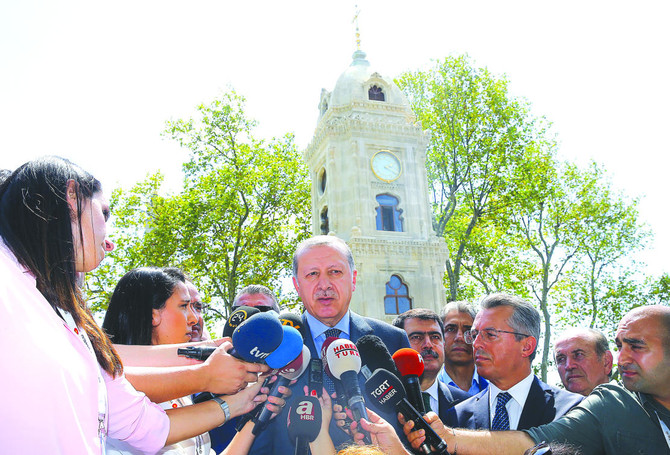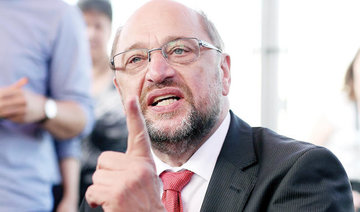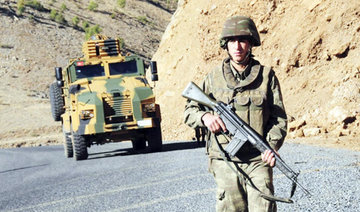ISTANBUL: Turkish President Recep Tayyip Erdogan defiantly stepped into Germany’s election campaign on Friday, calling on ethnic Turks not to vote next month for the two parties in Chancellor Angela Merkel’s ruling grand coalition.
Erdogan said ethnic Turks in Germany should not cast their ballots for Merkel’s Christian Democratic Union (CDU), the Social Democratic Party (SPD) of Foreign Minister Sigmar Gabriel or the Greens, as they were “enemies of Turkey.”
In a new row set to further escalate an already intensifying crisis, Gabriel immediately slammed Erdogan’s comments as an “unprecedented act of interference” in the sovereignty of Germany.
“I tell all my kinsmen in Germany... not to vote for them. Neither the Christian Democrats nor the SPD nor the Greens. They are all enemies of Turkey,” Erdogan told reporters in Istanbul in televised comments.
He accused the SPD and CDU in the election campaign of playing a game of “the more you beat up Turkey, the more votes you get.”
He said: “You need to support political parties there now which do not display enmity to Turkey.”
Erdogan did not make clear which German political party he would like people to support in the polls for the Bundestag on Sept. 24.
But he said he expected Turkish origin voters to “teach a lesson to the parties which are disrespectful to Turkey” when they cast their votes in a “struggle for honor.”
Tensions have spiraled in recent months between Germany and Turkey, in one of the most significant crises in years between two NATO allies with longstanding historical links.
Germany has lambasted Turkey over the magnitude of the crackdown in the wake of last year’s failed coup, which has seen several German citizens arrested, including journalists.
Ankara, meanwhile, has accused Berlin of meddling in its internal affairs and seeking to torpedo its long-standing bid to join the EU.
Turkish German journalist Deniz Yucel, the Istanbul correspondent of the Die Welt daily, has been held in jail in Turkey since February ahead of trial on terror charges.
German journalist Mesale Tolu has meanwhile been held on similar charges since May while activist Peter Steudtner was arrested in a raid in July.
According to German Foreign Ministry spokesman Martin Schaefer, there are 10 Germans, including dual nationals, in custody in Turkey.
Yucel, Tolu and Steudtner should receive consular visits from the ambassador in the coming week, he added.
While Gabriel’s SPD — whose chancellor candidate is ex-EU Parliament speaker Martin Schulz — and Merkel’s CDU are rivals in the election they have been in broad agreement on Turkey policy within the coalition.
Meanwhile, the opposition Greens have pushed for an even tougher line against Ankara. The Greens’ co-leader is Cem Ozdemir, who is of Turkish origin and has been bitterly critical of Erdogan.
Erdogan said that it was not Turkey’s responsibility to reduce the tension as it was Germany who is to blame, accusing Berlin of even being out of step with EU membership requirements.
Interference
But Gabriel denounced his comments as “an unprecedented act of interference in the sovereignty of our country.”
“Erdogan’s interference in Germany’s electoral campaign shows that he wants to incite people in Germany against each other,” he told the told the RedaktionsNetzwerk media group.
Schulz added in a tweet that Erdogan had “lost all sense of proportion.”
“And all the more we stand on the side of all those who are struggling for a free and democratic Turkey,” he added.
There are estimated to be some 3 million people of Turkish origin in Germany, many of whom came, or are the descendants of those who came, to West Germany as Gastarbeiter (guest workers) from the 1960s to make up for a postwar labor shortage.
Analysts say that some 1.2 million people of Turkish origin will have the right to vote in the September polls as German citizens. In the past, Turkish-origin Germans have inclined to the left with the majority voting for the SPD.
But Erdogan is also popular with Turks living in Germany, and 59 percent of the votes cast by Turkish citizens resident in Germany went to his ruling party in November 2015 parliamentary polls.

























